
Oct 24, 2017 | Columns, Food
By Alyssa Chen (VI)
Delicious sandwiches and burgers, massive portions, and quirky décor can all be found at Burger/Que of Basking Ridge, a relatively new casual BBQ and burger spot located on King George Road, only ten minutes away from school.
I had passed by Burger/Que many times on outings to Frozen Falls or O’Bagel: in the context of the plaza, the restaurant’s corner location seems to make it an afterthought. A few months after first noticing it, I suggested the spot to a few friends who were in the mood for burgers. It turned out that the little store had a lot more flavor than I had expected, both in terms of atmosphere and food.
The first notable item was the décor. Even before entering the restaurant itself, we passed by a large metal pig sculpture. Inside were paintings of cows and pigs, cute signs, and a hand-chalked menu board, among other little trinkets. The restaurant itself was not large, seating at most around 30 patrons at tables for mostly three to four people. The atmosphere was both laid-back and full of character, from the alternating blue and brick walls to the metal buckets on each table used for holding sauce bottles.
The food was flavorful and filling. We ordered cheese fries as a table; I ordered the brisket sandwich for myself. The cheese fries were topped with two types of cheese and served in a large portion—addicting to the three of us who were there.
The brisket sandwich I ordered turned out to be two of the thickest slices of toasted bread I have seen sandwiching a good amount of fatty beef brisket, onion straws, and provolone cheese. Just half the sandwich was more than enough for one sitting. The meat and onion straws seemed to overflow from the bread—not a negative, considering the excellent flavor and texture of both. The bread itself was probably one inch thick and toasted to a crisp.
My friends, who ordered the BYO (build your own) Burger and the Figaliscious chicken sandwich, seemed to enjoy their meals, too. Looking around the restaurant, I noticed other quirky and tasty-looking sandwiches, such as the waffle burger (a patty surrounded by two waffles).
As Naiyah Atulomah (VI) said, “Their food is so amazing, I don’t care how I look when I eat. By the end, I have food and a content look on my face.”
The only two complaints I might have for Burger/Que are that the portions are too large and the food is unhealthy. Of course, the latter is what one expects from such a burger joint, and the former “complaint” is really just a great deal, considering that most sandwiches cost $10-11 and that the restaurant provides carry-out boxes for those (like me) who cannot finish an entire sandwich.
If you are looking for a break from the usual dry or monotonous meal, or if you enjoy satisfyingly flavorful sandwiches, I would highly recommend giving Burger/Que a visit. A great meal awaits.

Oct 24, 2017 | Columns, Music
By Allie Verdesca (VI)
Transitioning from summer to fall is tough. Having to balance a new schedule while also getting back into the swing of schoolwork makes it easy to get overloaded with new information. However, one of the benefits of this season of change is the amount of new music being released. Hundreds of artists are releasing new songs for the fall, and with the help of fresh new sounds and outlooks, you’ll be better prepared to take on the new school year.
Looking for an edgier approach by a superstar? Try Taylor Swift’s new album, Reputation. Although the album won’t be officially released until November 10th, her lead single “Look What You Made Me Do” is already taking the world by storm. In mid-September, it was ranked number 3 on iTunes’s Top Songs and number 1 on Billboard’s Hot 100. Her other song from the album,“…Ready for It?”, also rose to number 4 on Billboard’s Hot 100. “Look What You Made Me Do” marks a significant shift in Swift’s musical style. Her last album, “1989,” was her first full-fledged venture into the world of pop music. This time around, Swift’s lyrics contain newfound themes of revenge and shady nods to those who have wronged her in the past. The rhythm of the song and its infectious beat provide the perfect backdrop for her spiteful lyrics and determined message. There’s no doubt that Reputation will become wildly successful upon its release.
Still popular is one of this summer’s most notable releases, Kesha’s album Rainbow. Following a controversial contract dispute and a sexual assault case, Kesha’s songs “Praying” and “Rainbow” show the singer’s renewed passion and positivity in the face of setbacks. A central theme of the album is affirmative energy, and this is not only reflected in the album’s vibrant and psychedelic music videos and album cover, but also in the very fibers of the songs’ rhythms. “Praying” is a pleading, satisfying pop tune with a good message of forgiveness and renewal.
On the more alternative side of the spectrum, Imagine Dragons’s new release “Believer” has a catchy and gritty beat that has commanded attention this fall. Their album Evolve, which was released last June, contains the band’s typical futuristic and post-apocalyptical sound, represented in its shouted vocals. The other main single off the album, “Thunder,” introduces a new, more synchronous style to the group’s usual intense chords and choral background vocals. It has a more generic pop sound, which isn’t my personal taste, but for those looking for more variety in Imagine Dragons’s usual sound, this song may be for you.
In this same vein of more rock-sounding, alternative beats, Fall Out Boy has been teasing their fans with songs off their album Mania, set to be released in January of 2018. The three leaked singles so far, “The Last of the Real Ones,” “Champion,” and “Young and Menace,” have already become immensely popular. “Young and Menace” has been a real experiment for the band. Ever since their last album American Beauty/American Psycho, Fall Out Boy has been experimenting with integrating a classic pop sound into their more traditional rock, angst-ridden, pop-punk sound. “Young and Menace” is one of Fall Out Boy’s first official forays into synth and auto-tuned sound effects, a recent trend in many popular songs. “Young and Menace” has a great build up; the song starts off soft, with a driving beat, until it finally coalesces into mass hysteria at the chorus. “Champion” is a much more subdued song, with a simpler instrumental accompaniment. It is more like their typical style; gritty, determined vocals are paired with a strong drumming beat to craft a great pump-up song that will be sure to get you through those first trying weeks of school. No matter how you’ve managed to deal with all the layers of stress that come with the beginning of the school year, I hope that all of these new releases will keep you motivated for a great year to come!

Oct 24, 2017 | Columns, Media
By Alexis Elliot ’18
Shots fire out at a local gas station. The culprit? Up-and-coming rapper Paper Boi. Atlanta opens up with a scene that epitomizes the message of the show: minor mistakes cause major damage. Coming off the heels of an Emmy award, Atlanta is a show that paints the hardships of life that so many people face in a profound way.
Writer and producer Donald Glover stars as Earn, a Princeton dropout who can barely make ends meet. Earn has to find a way to support his daughter and now his cousin, Paper Boi. Desperate to make an income, Earn turns to music management after seeing the success of Paper Boi’s new song.
However, before Earn can make an attempt at making a career out of Paper Boi, he first has to await bail for the gas station incident. Earn and Paper Boi sit in jail, and while the scene is depicted simply, Donald Glover inserts several critical messages. First, one of the inmates is clearly mentally ill and repeatedly provokes the guards. They know he is ill, but the guards just laugh at him. The guards wait until this inmate pushes their annoyance to the edge to finally rough him up. Earn is in shock and pleads for the man, asserting that the latter is mentally ill and doesn’t know how to control his actions. In addition to mental illness, other issues such as transphobia and homophobia are explored in Earn’s time in jail, all in a single scene.
After their time in jail, Earn and Paper Boi return to their project of turning Paper Boi into a household name. The rap life proves to be difficult as Paper Boi has to dodge critics, make ends meet, and clean up his name after the gas station incident. Earn and Paper Boi are accompanied by their sidekick Darius, who often holds them back from success. The trio symbolize the misfortune of opportunity without resources.
Paper Boi has the talent to be a street rapper, but he has to learn the reality that the street life widely differs from real life. He needs to learn to make connections with important reporters, promote himself at clubs, and manage his money properly.
As a rapper himself, Donald Glover tries to portray the message that the rap life isn’t easy and not everybody makes it. In Atlanta, Donald Glover shows the constant setbacks that characters face including homelessness, racism, and a lack of resources. Yet what makes the show outstanding is the fact that Glover manages to convey these subjects in a comedic manner.
One example is the scene when Earn decides to impress his girlfriend Vanessa by taking her to a fancy restaurant. Earn only has $90 in his bank account to spend on their night out. Viewers see how Earn tries to avoid paying for parking, orders only one glass of wine, and orders the cheapest meal on the menu. However, Vanessa insists on getting a valet, she orders a bottle of wine, and the pushy waitress makes them try every expensive item that the restaurant serves. In this scene, along with many others, viewers find comic relief from how relatable Earn’s struggle is.
At other times, I found myself laughing until I realized the veracity of the underlying message. In a satirical episode, Paper Boi is starring on a show called Montague, and during one of the breaks, a cartoon commercial for a cereal similar to Froot Loops appears in which the kids steal the cereal from a mummy. As I was laughing at the stupidity of the commercial, a police officer appears and pins the mummy to the ground. I began to realize how Atlanta uses its creative genius to touch on a subject as deep as police brutality in a fake commercial. I literally had to rewatch the scene to better understand the message.
This is what makes Atlanta different. Viewers laugh at the comedy of the struggles that the characters face but are also challenged to pick up on the various messages that it leaves behind. Although the storyline simply follows an up-and-coming rapper and his manager, Atlanta causes the viewer to question all aspects of society. I highly recommend this show, and its short, hilarious episodes make it an easy watch. Season 2 doesn’t come out until 2018, so there is still a long time to catch up on this fantastic masterpiece.

Oct 24, 2017 | Columns, Fashion
By Kristine Fu ’19
Although the summer season of sundresses and denim shorts has sadly ended, fall is the perfect season to mix and match your summer wardrobe with cozy sweaters and cardigans. With temperatures rising and falling from 50 to 75 degrees in a single week, it may seem difficult to dress appropriately. However, it’s always a good idea to dress in layers during seasons like this, especially since some areas of the school are freezing cold while others are extremely warm. Cardigans and vests are definitely good investments for this season because of their versatility, simplicity, and comfort. Plaid shirts, which can be worn by men and women, will forever remain the staple item of fall fashion. New trends and looks in the hall for girls include: wide hoop earrings, flared sleeves, and Steve Madden flats. New trends and looks in the hall for boys include: rolled up khakis and basketball jerseys on dress down days. Both genders, however, forgo on the “no white after Labor Day” rule, opting for classic white sneakers. Frequently seen in the halls are Sperry topsiders, which are designed to be boating shoes. The rubber sole and comfortable lining makes it a sensible choice for girls and boys. As the weather starts to get colder, leather boots are a good way to keep warm while evoking elegance and style.
Although private schools like ours are stereotypically depicted to be preppy and pastel, don’t be afraid to break away from the trends and express yourself! The beautiful fall colors are perfect for inspiration. Rajeev Doraswamy (V) gives some tips on men’s fashion: “I like wearing vibrant fall colors like a bright maroon and even matching the color themes of my collared shirt with my pants.” Kat Deliargyis (V) also agrees that color is a highlight of this season commenting, “My favorite part of fall fashion is the colors, especially in eye makeup and statement earrings. It’s all about the really funky stuff.” There is no better time to experiment with gold eyeshadow, peach blush, or a Bordeaux lipstick than this season. Kat also brings up a good point about statement jewelry. Any ensemble can be dramatically changed when paired with a layered necklace or a set of tassel earrings. One of my favorite things to do is to go to flea markets in Chelsea in New York City to find unique pieces of jewelry.
There have also been exciting new changes to the school dress code, which now allow for shorter dresses and skirts (at 4 inches above the knee) and tailored T-shirts. On the other hand, the dress code for dress down days will be more strictly enforced, officially banning sweatpants and pajama wear. While some may argue that limitations restrict creativity and self-expression, as Mr. Shilts said in my sophomore year English class, “under limits, one becomes even more creative.”
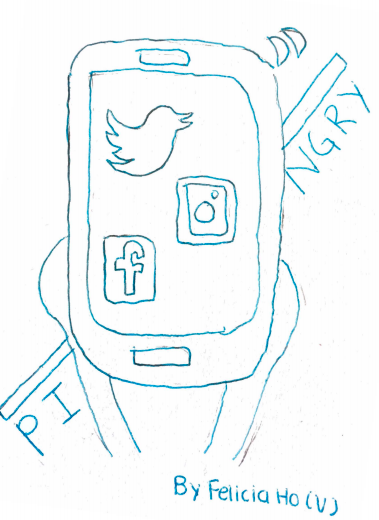
Oct 24, 2017 | Opinion
By Anna Wood ’18
Simply put, media is powerful. A single hashtag or posted message can influence people for months. We’ve seen trends such as store robberies and dangerous stunts. We absorb the posts we see online, oftentimes more than we think we do. As members of society, we should keep this in mind. Rachel Chen (VI) agrees. “On one hand, I understand that we are students and we do represent Pingry,” she said. “We’re supposed to be the best and the brightest–representing honor and integrity and citizenship.”
On the other hand, we are allowed to exercise our rights, including freedom of speech. While we are fortunate to have this liberty, consequences are inevitable. Ultimately, it is the individual’s decision to gauge whether or not their message will influence others in a positive manner.
Pingry, however, is a private day school — and one of the strongest in the country, at that. Resources, time, and energy shouldn’t always be spent dwelling on events that aren’t directly affiliated with the school. Actions displayed at athletic competitions, arts performances, and on campus activities reflect the values of the Pingry community; informal events between students do not mirror Pingry to as full of an extent. Private details of students’ personal lives should not be mixed with their academic endeavors, as long as those details don’t reflect their behavior on campus. Provided that Pingry students are honorable, dedicated, and respectful in their daily lives on campus, it is not up to the school to decide what students do in the privacy of their own homes.
The Honor Code states, “The members of the Pingry community should conduct themselves in a trustworthy manner that will further the best interests of the school, their class, and any teams or clubs to which they belong.” Pingry students who dutifully serve their athletic teams, clubs, and classes certainly follow this aspect of the Honor Code. Certain human values can be encouraged, but cannot be wholeheartedly enforced outside of the community.
Unfortunately, social media is melting the privacy that keeps home and school separate. Social media is the easiest form of communication, but it can be misinterpreted. A post not intended to harm others can most certainly do so if we aren’t careful. Content shared on social media can compromise safety and reputation, even when privately shared.
Some may argue that nearly every platform of social media allows the user to go “private,” disabling strangers from viewing his or her posts. Others may add that online expression changes relative to the platform of social media. Among the younger community especially, Facebook, Twitter, and Reddit report the most use in retrieving news, whereas Instagram, Snapchat, and Youtube are used in a more casual manner (“News Across Social Media Platforms 2017”).
That being said, media users must still be cautious on their Snapchat accounts or their private Instagram profiles. Posts are not only viewed but also shared and discussed. In other words, private isn’t truly private. A post that sparks political controversy, no matter how concealed, will still emerge from the shadows and be spread to every corner imaginable.
Liberty lets us flourish in our own opinions and ways of life. But limitations are still present. We
must utilize the privilege of freedom with maturity values are destroyed over
social media, they are destroyed in the real world.
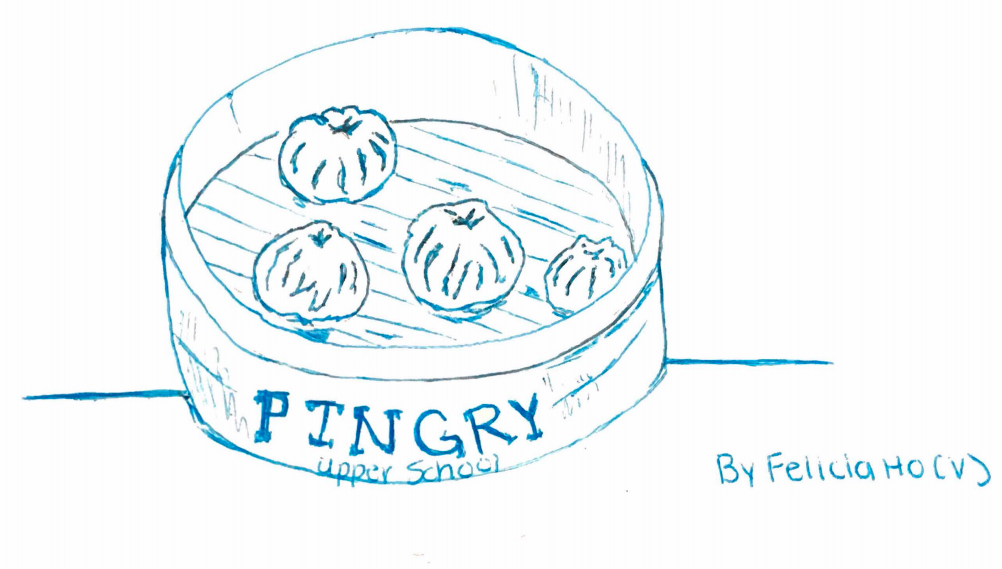
Oct 24, 2017 | Opinion
By Felicia Ho (V)
Transitioning into high school is a lot like walking into a dim sum restaurant. Sometimes you hear great ‘reviews’ of high school, sometimes you only hear about the huge amount of pressure during high school. However, you never know until you truly experience it yourself.
In a dim sum restaurant, like the one I go to with my family, you are greeted by an eager old woman who whips out a red stamp maker and a pen and begins to list what she brings to the table from an overflowing cart.
“Over here we have some chew beef tripe, fresh from the kitchen,” she says. “And here are some soup dumplings and noodle rolls, and some shu mai! Finally over here we’ve got some filling tofu soup.”
Her auctioning descriptions finished, she impatiently clicks her pen and waits for your answer. So what would you like? she wants to know, already ready to move on to the next table.
Ninth grade can feel exactly like that.
At first, it seems overwhelming: suddenly, teachers aren’t holding your hand anymore, and your friends seem to be so competitive. Just like the servers at a dim sum restaurant, more and more people seem to be impatient. Each teacher expects you to treat his or her class as your focus, and thus they pile work onto you, yet you still have to make time for hanging out with friends.
Although it may be hard at first, my suggestion is that you try to look beyond the pressure in high school. In other words, think beyond what the servers at the Pingry high school dim sum restaurant may think of you.
Think about what’s on the cart, instead.
Beckoning to you are tons of clubs, striving to get your attention and attract more members. Some are science-related, such as Anatomy Club or Journal Club, while others are more humanities-focused, such as Toastmasters or the Pingry Record. On other plates sit other clubs related to Community Service or environmental issues, and still more clubs revolve around the idea of exploring different hobbies and interests, such as debate or astronomy.
With so much to choose from, how do you decide?
It’s freshmen year, so just go for it!
Just like in a dim sum restaurant, what may sound gross at first, like the steamed beef tripe (cow stomach), might actually turn out to be great (steamed beef tripe is one of my personal favorites)! Once you’ve got a great selection in freshmen year, you can start developing which clubs are your favorites – which ‘dishes’ do you always come back to every day you walk through the doors of the school? Throughout your four years in high school, you’ll become the expert on these dishes, and you will grow to be a frequent customer of this dim sum restaurant. You will become an expert on the culinary delights of high school.
Don’t worry. You won’t be alone! Although some teachers, just like some servers in the dim sum restaurant, will set seemingly impossible deadlines, others will become your support base throughout your high school career. Your friends and family are also a part of this group, and when you’re not sure what order to make, don’t be afraid to ask for their opinion; they’ll be glad to help.
Oct 24, 2017 | Opinion
By Megan Pan
One morning last week, I was driving myself to school when I got into an accident.
It wasn’t anything terrible. I was a little careless on the turn into the school driveway, and my car ended up scraping against the curbside stones. Aside from a harsh clang and the physical jolt of the ricochet, it wasn’t too serious, and once I parked and headed inside I thought nothing more of it.
Flash forward to 5:30 that afternoon: tired from classes and play practice and dreading the work that awaited me that evening, I was more than ready to enjoy the drive home, listening to music while coasting thoughtlessly down the highway. However, as soon as I accelerated onto I-78 eastbound, I noticed that there was a loud, rhythmic thumping noise coming from the back of my car. Panicking, I made the first exit I could and trudged along until reaching the nearest gas station.
As it turned out, I had actually blown a tire from my accident that morning. Somehow, I had failed to notice it after parking and even upon returning to my car in the afternoon. Luckily, a trucker filling up at the gas station was kind enough to lend a hand. He replaced the flat tire with the spare in the trunk, walking me through the procedure so I would know what to do in the future.
“Thank you so much,” I said to him after he was done. “If it hadn’t been for you, I probably would’ve kept driving on the blown tire.”
“You wouldn’t have wanted to do that,” he replied. “You could end up really causing damage to the axle or the hub or something if you keep driving on a flat tire.”
Having been told not to drive over 50 miles per hour on a donut, I scouted a new route home that wouldn’t take me along any freeways. On local roads, it would take about 40 minutes in order to get home. Seeing as I had little other choice, I sighed and buckled myself in for the long ride.
As it turned out, I actually quite enjoyed this little detour. Following this route, the landscapes were much prettier and more varied than the industrial gray and the conventional green of the roads and signs along the highway. Ambling along winding roads and steep hills, humming along to my favorite songs while admiring the view of the setting sun, I was able to experience a rare 40 minutes of tranquility in the car all by myself. I didn’t think about the work that I needed to do or the upcoming deadlines for all my assignments or even the editorial I had been procrastinating for the newspaper. I just drove and drove and made my way back home.
You might be wondering why I’m telling you this, all of which seems to add up to simply an anecdote of a minor inconvenience in an otherwise ordinary day. But by the time I pulled into the garage that evening, I had realized something important.
Since the beginning of the school year, I have been working myself to the point of exhaustion in the attempt to do everything. Juggling a full course load, college applications, extra-curriculars, and family obligations, I have skipped meals, shed tears, and sacrificed sleep to try to get everything done. In terms of my physical and mental well-being, I had definitely blown a tire. In spite of that, I was still struggling to keep going on a flat tire, resulting only in ineffectiveness and further disappointment.
Within the Pingry community, there is a sense of urgency pervading the atmosphere that makes many people feel as if they’re running a race in which they can’t afford to stop or slow down. There is a constant deluge of things to do, and with the added pressure of seeing everyone else around you working hard, you push yourself past your limit to be able to keep up.
But you can’t keep driving on a flat tire. It’s simply not practical, and you run the risk of causing further damage to yourself, whether you sputter out from excessive fatigue or explode in a burst of stress and frustration. What students must come to understand is that when they find that they’ve reached a point at which trying to keep going would only prove counterproductive, it’s necessary and perfectly fine to take a moment to breathe. When times get rough, take the time to perform repairs, fill up on gas, and pick up a couple of snacks from the convenience store. Then, you’ll be ready to hit the road again.
People often use the metaphor that life is a marathon in the sense that it’s a long-distance race and you have to pace yourself. However, I’d like to provide a modification of that metaphor. To me, life is not a quest to complete a set distance along a set course while competing to achieve the fastest time; in fact, it’s not a race at all.
To me, life is a long car drive. All of us are driving at different speeds and in different directions, and we’re each going someplace different. But no matter where we’re headed in the long run, it’s important to take the time every once in a while to exit the highway, slow down, and truly enjoy the scenery.
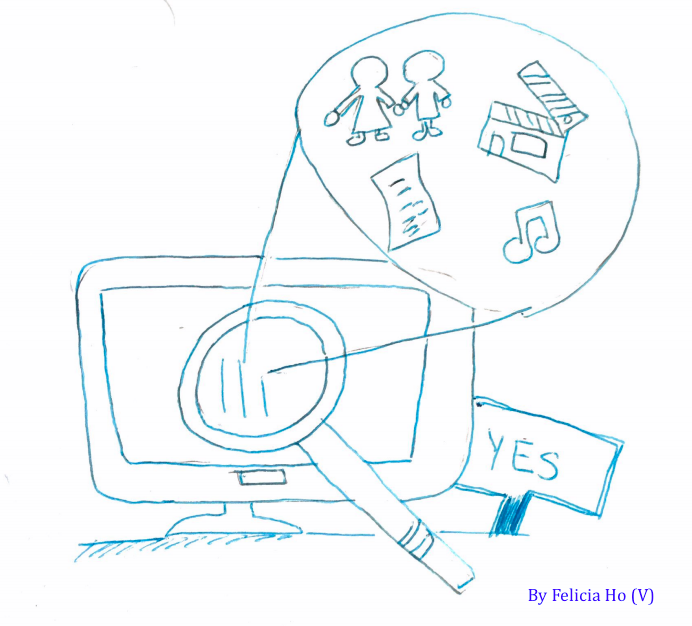
Oct 24, 2017 | Opinion
By Ketaki Tavan (V)
We’re told as children that sitting in front of the TV is a waste of time. It hampers creativity, creates couch potatoes, fosters laziness, and leads to a meaningless existence. We’re told that our time would be better spent reading a book instead.
Reading books is an exercise for our brains that teaches us how to analyze and interpret what comes our way, feeds us valuable life lessons that we can implement at our liberty, and makes us thoughtful contributors to society armed newfound knowledge regarding the human experience. But why do we see watching movies and TV as incapable of doing the same?
In recent years especially, I’ve become more acutely aware of the value of English class. The chances that I will encounter the precise themes of Pride and Prejudice or Holden Caulfield’s “coming of age” in The Catcher in the Rye at some point during my future career are likely slim, but the act of reading these books, I’ve realized, doesn’t hold its value in the way we might initially assume.
In English class, we’re taught how to read, or rather, how to consume media. And I’d argue that this exercise in the thoughtful consumption of media can be beneficial when applied to quality movies and TV as well.
We spend years training our minds to read a certain way: to engage in critical analysis, to become more attuned to detail, and to look beneath the surfaces of these works to draw connections to the larger world in which we live. To my surprise, I began to notice myself watching movies and TV through a similar lens.
At face value, movies and TV provide entertainment, and I’ll be the first to admit that some media is good for nothing more. However, there is a host of digital material out there that is thoughtfully crafted and can prompt its audience to engage with the cultural moment in which we live and the facets of our contemporary world.
Take Black Mirror, for example, a controversial and thought-provoking series that explores the uneasiness of our modern world. Each episode considers a different injustice, tapping into the psychological damage of war, the disturbances of our technology-obsessed society, and the troubling themes we have come to label as entertainment.
Watching Black Mirror prompted me to consider our world in its current state in a way that, as I read more and at higher levels, great literature does as well. Despite its satirical and amplified portrayal of our current problems, Black Mirror acts as a stimulus that prompts viewers to unearth the glimmers of these issues that can be seen in our modern world. In a subtle way, the show shapes its audience into active, engaged contributors to our society.
Showtime’s Shameless, a TV series about a dysfunctional family struggling to make ends meet in South Side Chicago, is another show that has stimulated my mind in a way similar to that of literature.
Shameless is my favorite TV show for a host of reasons, the biggest reason being that it’s what first allowed me to recognize the value of quality television. The show’s directors artfully underscore the nuances and depth of the human experience, and the fact that their vehicle to convey this narrative is digital allows for the engagement of the audience’s senses in a way that is unique from that of literature.
Watching Shameless becomes more than following an admittedly entertaining plot; it begs you as the viewer to give credit to its subtleties. Prior to my watching Shameless, never before had a TV show commanded me to pay attention to its soundtrack, staging, camera angles, and script. It effortlessly conveys the rawness of human relationships and the very real and relevant stories shared by many American people today. This detail and these messages are familiar—they’re the heart of the academic literature we’re told to read and taught how to read.
Movies and TV shows aren’t a replacement for the enrichment that reading provides, but they can sharpen our intellect in similar ways that reading can.
I encourage people to discard the belief that TV and movies are a mindless way to squander time, to recognize the genuine and powerful properties of digital media, and to consume them in an intentional manner that, in many ways, parallels the treasure that is reading literature.
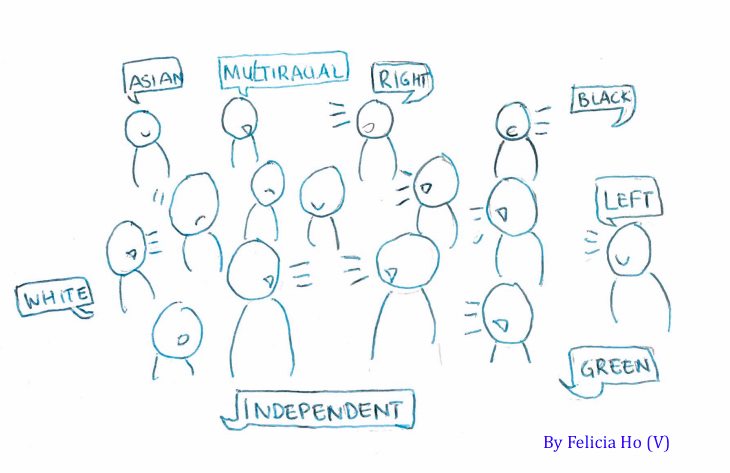
Oct 24, 2017 | Opinion
By Miro Bergam (V)
“Lean into discomfort.” This phrase may sound familiar from the multiple diversity assemblies you’ve been asked to attend in your years at Pingry. It is a part of a list of “conversation norms” that Pingry’s diversity work is grounded in. For many people, this phrase and the list of norms have gone in one ear and out the other. However, I have found that recently, the world that surrounds us has given these norms more context. In particular, I believe the political conversations our country is currently engaging in and the way they translate tangibly into our interpersonal relationships and lives at Pingry has made the norm of leaning into discomfort a necessity.
I had this realization at a leadership workshop hosted by Pingry’s diversity department this past August. Student leaders from sports teams, clubs, Student Government, SDLC, and Honor Board were asked to attend this training session, which involved engaging in different activities led by John Gentile, a diversity practitioner who specializes in working with white males.
In the latter half of the activity, the white males at the workshop were isolated into their own group. For the first few minutes, the group was dead silent. The silence was killing the whole intention of holding such a group: everyone was supposed to lean into discomfort and air out the white male opinions that are often overlooked in diversity work. But once people started participating, lightning struck the room: it was uncomfortable, it was problematic, and heads were clashing, but it was exactly what we needed. Everyone leaned a little bit out of their comfort zones, and it unearthed a landmine of opinions we desperately needed to addressed and confront in our world of white supremacist marches and national anthem debates.
Last week, Mr. Conard delivered a much needed speech addressing these conflicts. He shared his own opinion denouncing the white supremacists who marched in Charlottesville, and he commented on the way our current atmosphere politicizes every aspect of our lives, even including our day-to-day conversations.
One of his main points was that although he finds the white supremacists’ stances abhorrent, he believes “they have a right to voice their opinions.” This may strike some people as the opposite of what we should be doing—if their opinions are “wrong,” then why should we even give them a platform? Along the lines of Mr. Conard’s statement, I argue that continuing to push these repulsive opinions under the radar is simply feeding a large, silent beast of discontent and frustration that is occasionally released in horrifying moments like the white supremacist rallies that have swept Charlottesville.
Through hearing out the opinions of Pingry’s white males at the leadership workshop this summer and listening to dissenting opinions as a leader of the white affinity group, I have learned that the endgame is not always about coming to an agreement, changing someone’s mind, or “winning” the argument. All it takes is a dialogue and platform that respects both sides, regardless of how ugly each person thinks the other’s opinions are, to begin chipping away at the massive divide that seems to have polarized our country and school recently. Simply honoring someone’s opinion by hearing it out, regardless of whether or not you agree with it, builds a sense of mutual respect.
The key to this is leaning into discomfort. If you have a far left opinion that you think no one will take seriously, lean into discomfort and voice it. If you have a far right opinion that you feel has no place at Pingry, step out of your comfort zone and let it be known. I believe Mr. Conard did an amazing job of stepping out of his comfort zone to address the school on such a contentious issue—setting an example we should be seeing more often from our school’s leadership in such divided times.
I urge you to follow his lead: join the open forums, attend affinity groups, and engage in difficult conversations. As long as you hold these dialogues in a productive way, without the goal of “winning” over or “beating” others, then you should find spaces to voice your opinion and lean all the way into discomfort. In Mr. Conard’s words, “I encourage you to engage in respectful dialogue about these issues—they are not going to go away.”
Oct 24, 2017 | Opinion
By Rachel Chen
I used to believe that if I didn’t read the end of a book, it never ended. Like if I didn’t finish Harry Potter and the Order of the Phoenix or Mockingjay, Sirius and Rue would go on existing perpetually, even aging and dying naturally. (Spoiler alert!) The characters would find a way out, and somehow everyone would live happily ever after. Or at least, you know, live.
That’s a bit like how I feel right now, at the start of my senior year. In the books of our high school lives, we’re hovering right on the precipice of the grand finale. There’s so much anxiety and suspense in the air, but there’s also this great sense of potential and excitement for the ending—it’s a rollercoaster ride and I don’t know if I’m screaming out of fear or exhilaration.
Because the thing is, I’m not scared of what I’ll find at the bottom. I know my friends and family will be there to catch me and cheer, just like I know every single one of us will go on to be happy, do great things, and change the world. It’s not the fear that gets me, but the anticipation. Where will I find myself when I open my eyes and catch my breath?
I honestly have no idea.
All I know is that our stories are shaped by the relationships we’ve formed, the roles we play, and the duties we owe. Every failed side quest and hilarious mishap has pushed us along; every Forbidden Forest explored and boss battle conquered has moved our character development and story arch. All this rising action leads up to an inevitable conclusion—and once we know that conclusion, we can never change it again. And that terrifies me. What if I close this chapter of my life regretting that I didn’t finish strong?
So I guess what I’ve realized is that now is a good time to evaluate the narrative I’ve written at Pingry and decide how I want it to end. Fortunately, it’s not yet set in stone. My fellow seniors and I are still writing; we still have a say in how our Pingry adventures wrap up. It’s not too late to change some storylines—to fix that friendship you lost in Chapter Five, say, or to tie up the loose ends from that misplaced romantic subplot. Certainly, it’s time to call upon that powerful wizard ally for advice and support. God only knows that we need all the help we can get in these next few months.
To my underclassmen too, all of you familiar faces I love and unfamiliar faces I can’t wait to meet: Now is the time to write. Write the story you want to read, the adventure you want to tell. Commit yourself to being the best and bravest version of yourself now, because all your sweat and tears add up. You will thank yourself for it later.
Now my question to you is: How do you want your story to end? And what are you going to do about it?
There will come a moment when we’ve all finished our journeys. We’ll turn the final page, close the cover, and mull over the endings we discovered. We’ll either set it on the shelf or burn it, depending on how you feel about your narrative. But either way we can’t go back to reread it, to experience it again for the first time.
That moment will inevitably arrive—after all, despite my denial, Sirius and Rue still die in their respective books—so let’s focus on the present, while we still hold the pen in our hands. Let’s write our stories as they’re being told. Let’s change the endings while we still can.
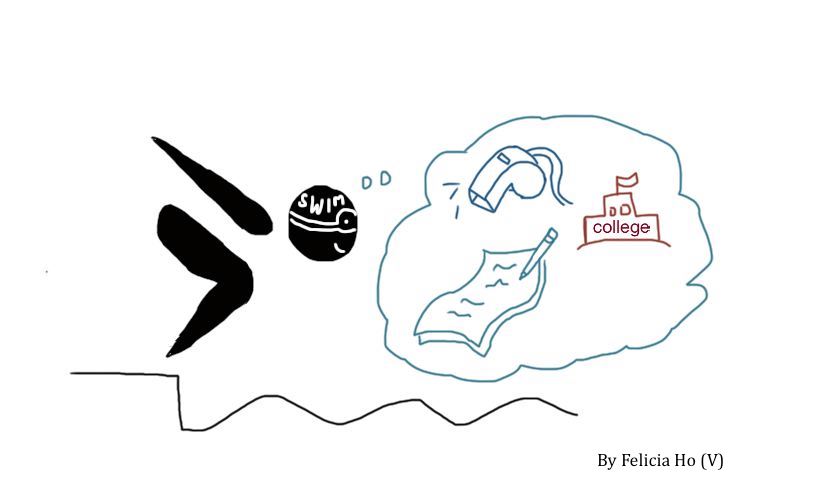
Oct 24, 2017 | Opinion
By Darlene Fung (V)
I still remember my first day of swimming lessons. Six-year-old me was splashing around, when my instructor clapped his hands and announced, “All right, you’re going to put your head in the water now!” I looked up at him through my oversized purple goggles and immediately shook my head. There was no way I was getting my face wet. The water was scary: there was so much unknown under there and, most importantly, there was no air. “Come on, just put your head under,” he said again. “One, two, thr— ,” and before I knew what was happening, a large hand dunked my face into the water. Needless to say, I came back up sputtering and crying.
Now, ten years later, I’m experiencing the same feeling I felt on my first day of swim lessons with the college recruiting process. Similar to that day, I am nervous, uncertain, and feel as if I have been tossed into something before I am ready.
Starting September 1, 2017, college coaches were officially allowed to begin recruiting swimmers in the class of 2019, relatively late compared to sports such as lacrosse and softball in which athletes may be recruited as early as middle school. Yet I still felt as if this whole process is starting way too early. After all, I’ve barely even started junior year, let alone taken the required standardized tests. It made me realize that while being able to commit early seems like a great opportunity, there are shortcomings to the system that should not be overlooked.
For those athletes who are recruited early and can commit to their dream school, their hard work has finally paid off and it appears to be smooth sailing ahead. However, a great deal can change in a few years. For instance, coaches may move to different schools so that by the time an athlete gets on campus, he or she may face a new coach and an unexpected training program. The team atmosphere may also be different by the time an athlete attends a college, because the players with whom the athlete met when he committed will be different than the teammates with whom he will play. Finally, the athlete himself or herself may change. What was the perfect school when an athlete committed may no longer be perfect as the athlete grows and his interests change. When asked about her recruiting experience, softball player Angelina Mayers (V) said, “I’ve waited to commit because you never know what may happen in the future. I had my heart set on one school in the past, but now I’m very interested in other schools.”
More importantly, early recruiting puts unwarranted stress on young athletes. In order to be recruited early and land a commitment to a top school, young athletes oftentimes put a lot of pressure on themselves to constantly perform well in front of college coaches. Mayers continued, “I am away almost every weekend either for a tournament or at a camp that a college coach asked me to go to.” Furthermore, those athletes who are working hard but are not offered commits feel added pressure to practice even harder to get coaches to notice them. This cycle risks overtraining and injury.
To young athletes who feel the pressures of early recruiting: Relax. Make sure you don’t get caught up in the frenzy. Take your time to explore your passions, do what you love, and get to know yourself, so you are ready to make the best decision for yourself when the time comes. At Pingry, we are lucky to have understanding and experienced advisors, college counselors, and coaches to guide us through the college process and help us make these important choices. With help, preparation, and knowledge of ourselves and what we hope to get out of the college experience, I think no athlete should have any trouble diving headfirst into the water.
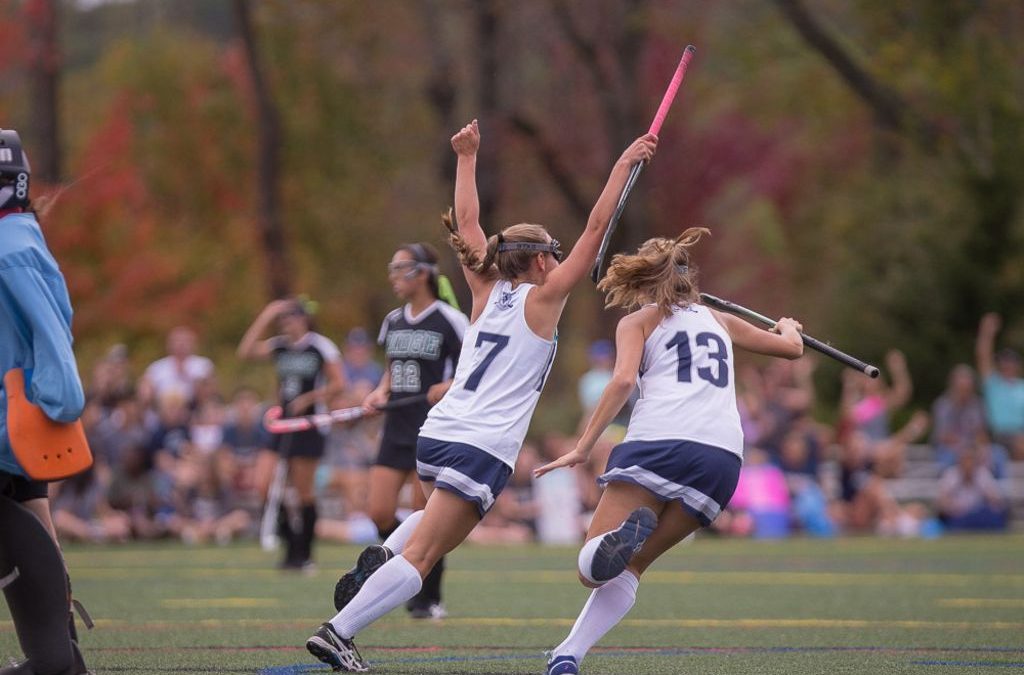
Oct 24, 2017 | School News
By Allie Verdesca (VI)
On a beautiful, hot Saturday in early October, Pingry hosted its annual Back-to-School Day and Homecoming. Just over 900 parents arrived promptly at 8:15 AM, prepared to experience a day in the life of their children’s schedule and a chance to say hello to their teachers. After a morning full of interesting discussions and back-to-school memories, the Homecoming events began in earnest. The focus this year was Pingry sports, celebrating the school’s beautiful new athletic spaces, including the football team’s new stadium and turf field.
A group of 700 students, parents, and Pingry alumni attended the festivities. Lunch was a bountiful barbeque, featuring hamburgers, hot dogs, grilled vegetables, and a table of delicious desserts, all made possible by the dedicated men and women from Sage Dining. Sporting events went on throughout the day, including water polo, boys’ and girls’ soccer, football, and field hockey. Visiting alumni could also participate in either a field hockey or a soccer game.
Pingry’s teams played well, especially boys’ soccer, beating its archrivals Holmdel with a nail-biting victory of 1-0. Captain Vineil Reddy (VI) accredited the win to a pre-game session by mental performance coach and psychology teacher Dr. Fisher and some Pingry soccer alumni, who encouraged the team to “focus on controlling the ‘controllables’” of the game. Reddy acknowledges the importance of this game to the morale of the soccer team, coming into the game with an overall record of 6-3-1. He believes that “this was the first game in which every single member of the team was completely focused.”
The soccer team was not the only one flaunting a victory. The field hockey team also won its game against Ridge, 5-2, with the help of junior Josie Jahng, who scored two goals and had one assist. The water polo team notched a strong win against Lawrenceville 10-7. However, the girls’ soccer team suffered a close defeat, losing 2-1 in overtime against Bernards. The football team also lost a high-scoring heartbreaker, 49-48, against Fieldston, with Obi Nnaeto (VI) scoring four touchdowns.
Both the Balladeers and the Buttondowns made their musical debuts for the year, singing “The Star-Spangled Banner” and “Old John Pingry” before the athletic competitions that day. While the games were occurring, children enjoyed games and face painting, and all attendees received free t-shirts.
After the athletic festivities were over, student council held its annual Homecoming dance themed “Under the Sea,” an evening full of music and friends. Senior Sehyr Khan says she “enjoyed all the fun outfits with her peers.” The dance was not only a rousing success but also a great way to raise money for the student council, and it marked the end of a pride-filled spirit week, complete with a pep-rally and themed dress down days throughout to keep spirits high. Overall, this year’s Homecoming was a great day to celebrate Pingry pride.
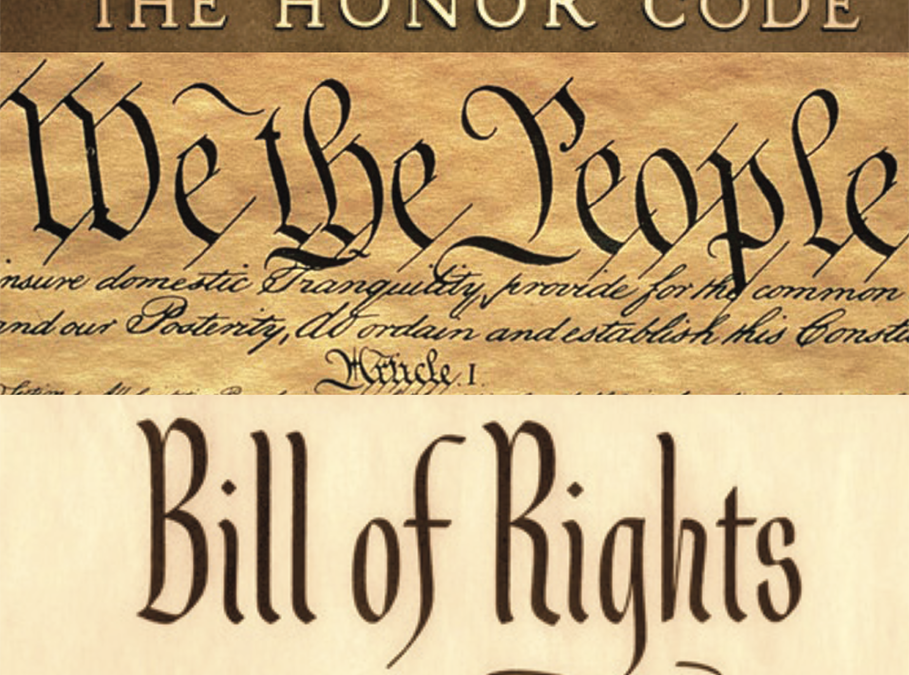
Oct 24, 2017 | School News
By Miro Bergam (V)
Mr. Conard closed off last week’s morning meeting with a speech addressing our country’s current national debates over the white supremacist rallies in Charlottesville and over NFL players kneeling during the national anthem. Mr. Conard began his speech by reciting passages from the Pingry Honor Code, the Bill of Rights, and the Preamble of the Declaration of Independence, stating that these are three texts that, as American citizens and Pingry students, are intended to guide us.
Mr. Conard then explained how today’s highly politicized society makes the discussion of such debates extremely difficult. As an educator, he said, “I am certainly entitled to my own political views; [however] I feel an obligation not to share them with you.” In the high-tension politics of today, this position becomes even more challenging, as any statement or lack of statement “is perceived as political or unpatriotic.”
Regardless, he finds the discussion of these political debates to be important. In order to conduct them productively at Pingry, he believes “we need to work hard to separate them from partisan politics.” He suggested that to achieve this we should listen to both sides, regardless of how ugly we may find the other side’s opinion. Mr. Conard said that although the white supremacists’ beliefs are “abhorrent to [him], and are both unacceptable and un-American,” he still believes “that they have a right to voice their opinions.”
This brought Mr. Conard to the topic of taking a knee during the national anthem. He maintained his stance on the freedom of expression and speech, saying, “If the flag is a symbol of our freedom, and is emblematic of the beliefs and rights articulated in the Declaration of Independence and the Constitution of the United States, then one of those rights is the freedom to kneel in front of the flag.”
Mr. Conard ended his speech by encouraging students to engage in these conversations productively and listening to each other through respectful dialogue. He invited students to continue this conversation in a series of Open Forums, spaces open to the whole school to have such discussions.
An Open Forum was held in the O’Connor Board Room later that day. Attendees split into groups to discuss different topics, including gun control and the recent shooting in Los Vegas, the UN decision to vote against banning the death penalty on the basis of sexual orientation, and kneeling during the national anthem at Pingry sporting events. Vicky Chen (V), who attended the Open Forum, said, “I talked about kneeling during the national anthem at Pingry sports games, and it was nice to have a conversation as sensitive as that with such a large group of teachers and peers.”
Regarding Mr. Conard’s speech and the Open Forum, Nabeel Jan (V) said, “I think they were a great way to start a dialogue on free speech. I think by having conversations we can only go forward together and not into a state of polar arguments, something that we should apply to other issues in our currently divisive political climate.”
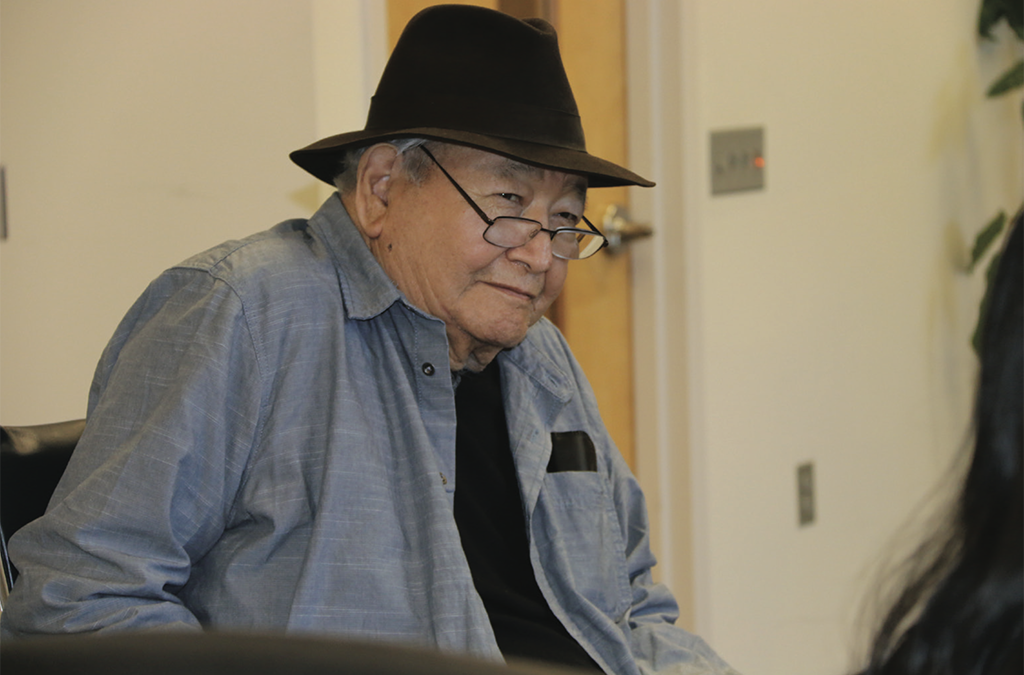
Oct 24, 2017 | School News
By Paige Maultsby (V)
Novelist, poet, and artist, Dr. N. Scott Momaday, visited Pingry on Thursday, October 5, for an assembly, a luncheon, and two creative writing workshops open to both Middle and Upper Schoolers. A Pulitzer Prize winning author and member of the Kiowa tribe, Dr. Momaday, was invited to the school, according to Assistant Headmaster Dinkins, “to animate the 2017-2018 professional learning theme, Diversity & Inclusion.”
The event was organized by Dr. Diana Artis, the Chair of the Diversity Department, with help from English Department Head, Chris Taylor, who coordinated student preparation for the event in English classes.
D r. Momaday spent the day sharing his knowledge and engaging in a thoughtful dialogue with students and faculty. Faculty prepared for the event by reading his Pulitzer Prize winning novel, House Made of Dawn. Guided by their teachers, students read selections of the novel and assorted poems in their English classes.
Though Dr. Momaday won the Pulitzer Prize for his 1968 novel, he considers himself to be a poet first and foremost. As for what draws him to poetry, he points toward its purity. “I think poetry is the best way to express yourself in literary terms,” Dr. Momaday told students during his workshop. “To write a poem is to say something in the best way that it can be said.” However, Dr. Momaday does not confine his writing to only poetry and novels; his past work ranges from plays to travel literature.
When it comes to influence, Dr. Momaday credits his parents with shaping him into the person he is today. He initially followed in the footsteps of his mother, who was a skilled writer, but later in life, he developed a passion for painting that his father had shared.
Also featured in his work is the influence of oral tradition. As a Kiowa tribe member, he grew up among countless stories, but they existed solely by word of mouth. “My father would tell me stories when I was a little boy,” Dr. Momaday said of his personal experience with the oral tradition. “They stuck in my mind, and I loved them so much I made him tell them to me again and again… One day I woke up to the realization that they were very fragile, that if I didn’t pass them on, they would be lost forever. So I started writing them down.” Out of this process came his best-seller, The Way to Rainy Mountain, a collection of Kiowa folktales supplemented with his commentary.
During the creative writing workshops, students had the chance to take their questions to Dr. Momaday, a true master of the craft. When asked to share what he has learned from being a writer, he responded, “How to be humble. Humility has a good amount to do with writing.” To the aspiring writers in the room, he advised, “If you can be humble about yourself and your experience and convey that humility to language, that’s quite an accomplishment. It’s worth doing.”
His words were not lost on the students. “I am so grateful that we were able not only to host him, but also to have personal discussions with him in the writing workshop,” said Grace Brown (V). “Not only did he give advice as an author which I can apply to my writing, but he also spoke on a deeper level to his thoughts about the human experience.” Though Dr. Momaday’s visit lasted no longer than a day — and ended with an evening event for parents at Short Hills — his stories and insights continue to resonate for many in our community.
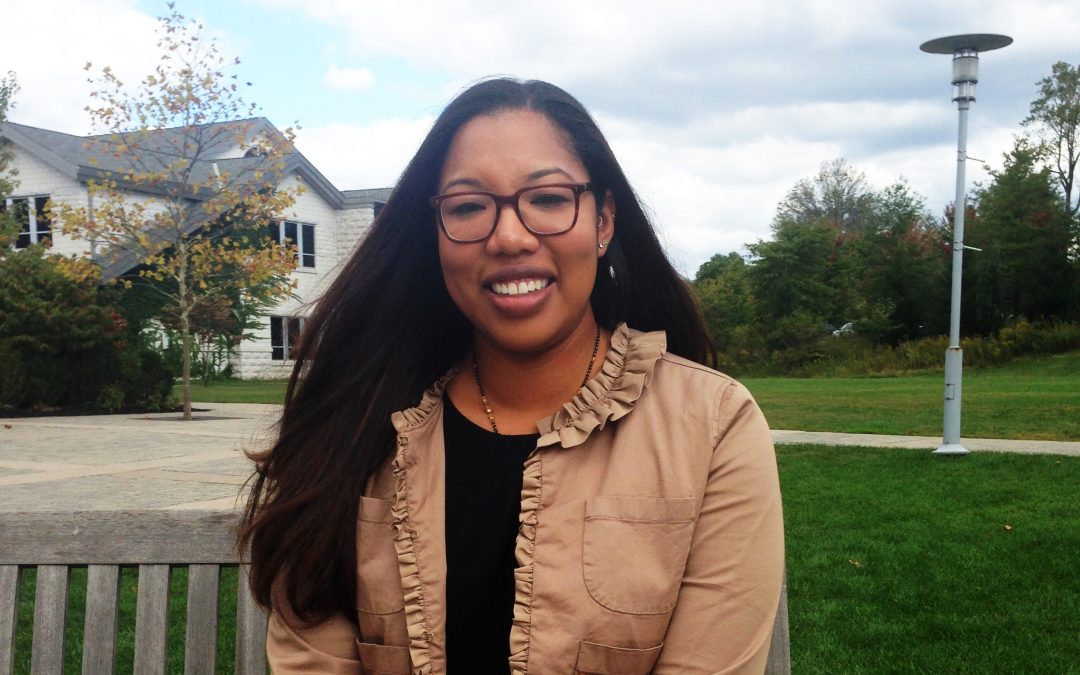
Oct 24, 2017 | School News
By Ketaki Tavan (V)
This year, Ms. Carol Mahida, who taught English in the Middle School last year, has taken on a new position in the Pingry community. In addition to teaching two sections of Form III English, She is now the Form III and IV Dean of Student Life in the Upper School.
Historically, Mr. Jake Ross has been the Dean of Student Life for Forms III-VI, but this year, the position has been split. “The younger and older groups have different needs,” said Ms. Mahida.
Ms. Mahida attended the University of South Carolina for her undergraduate degree, where she majored in English and minored in History. For graduate school, she attended Columbia University’s Teachers College and received a master’s degree in English Education. When asked about her college experience, Ms. Mahida said she “appreciated the freedom to explore who I was and what I wanted to do.”
While Ms. Mahida loved her college experience, she found her high school years to be even more formative than her college years. “I was an average student at a really large public high school, and in an environment like that, it’s easy to get lost in the shuffle. It wasn’t until I had two teachers that really saw me that I was able to learn what I was capable of,” Ms. Mahida said.
Because of her own high school experience, she commented, “what I love about working in a school environment is helping kids not fall through the cracks. I want to make sure that everyone has the opportunity to do what they want and to see what they’re capable of.”
When asked about her transition from the Pingry Middle to Upper School, Ms. Mahida said, “The Upper School is different from the Middle School in that students have reached a different maturity and skill level. Rather than teaching maturity and those skills, now I get to tap into the traits they have already developed and go deeper in conversation with students.”
Ms. Mahida was also drawn to the Upper School because of its significant female leadership. “It’s really exciting to see,” she said. “I have so many female role models that are incredible to watch and learn from.”
This year, Ms. Mahida thinks her biggest obstacle will be switching roles from teaching to being an administrator. “As a teacher, you’re guided by your classes, but as an administrator, you have to create your own schedule,” she said. “You have the time to plan and dream and help make goals for the school… it’s like being back in the learning stage, which is really humbling and exciting at the same time.”
When asked what she would like the school community to know, Ms. Mahida said, “Please introduce yourselves to me! I would to love learn more about everyone, and I’m always someone who will listen.”













